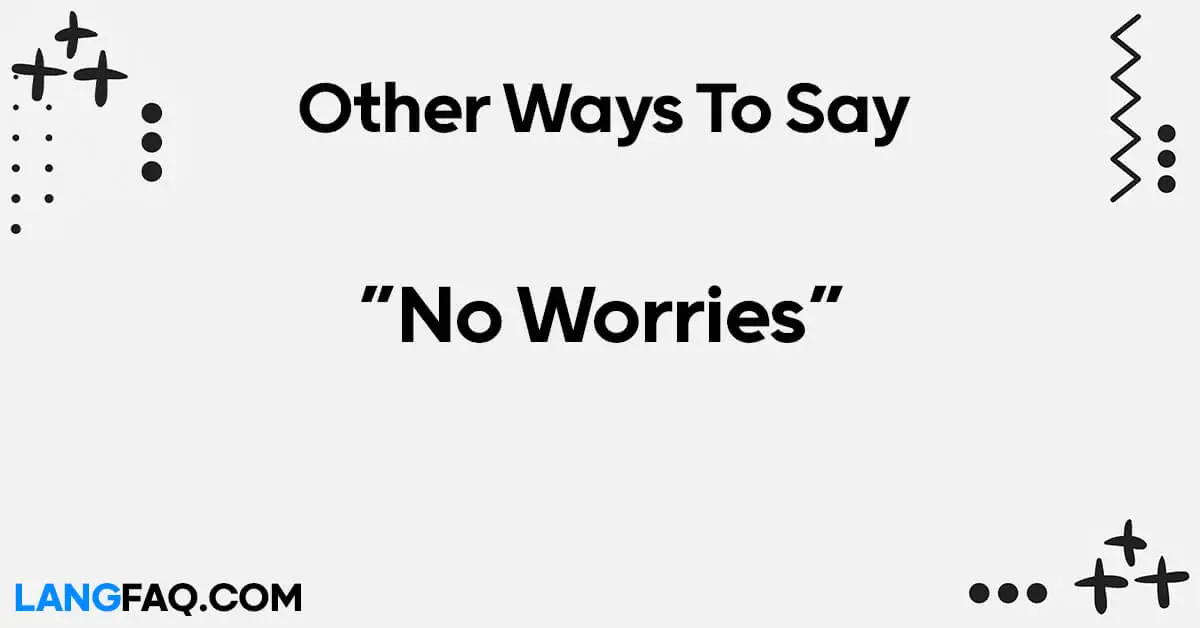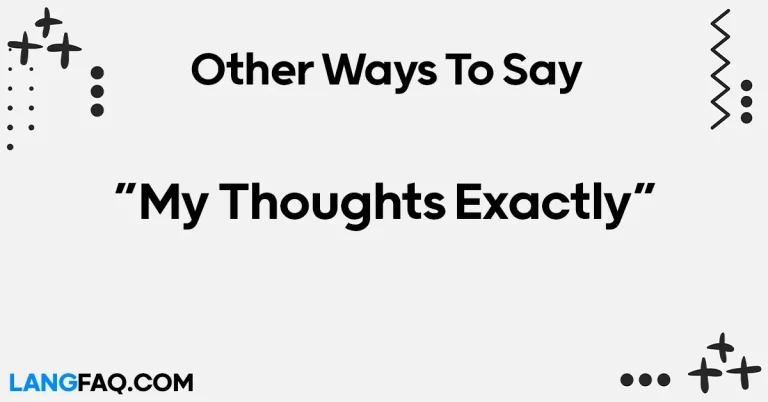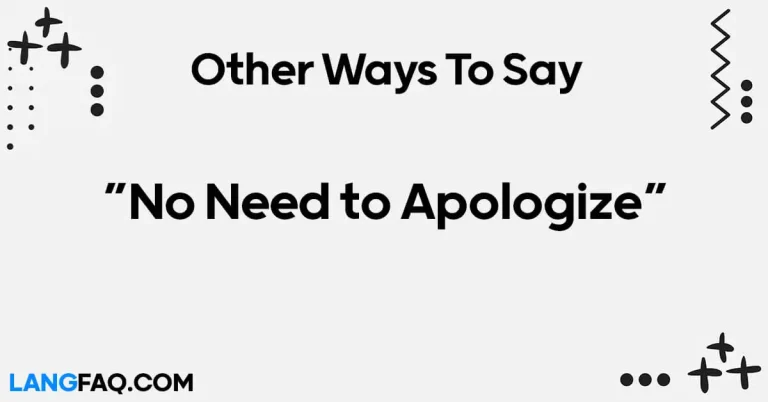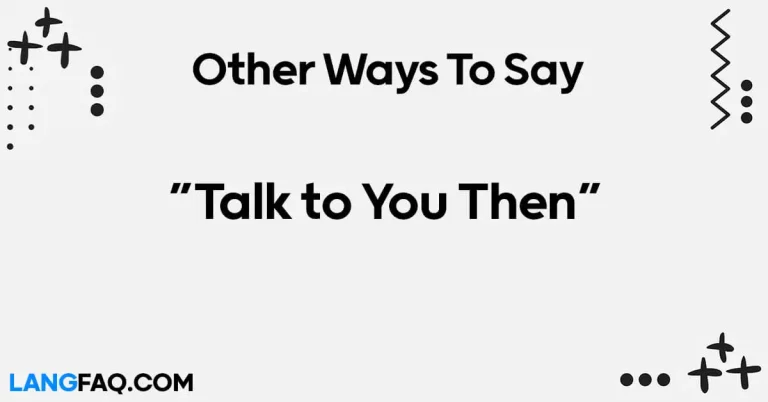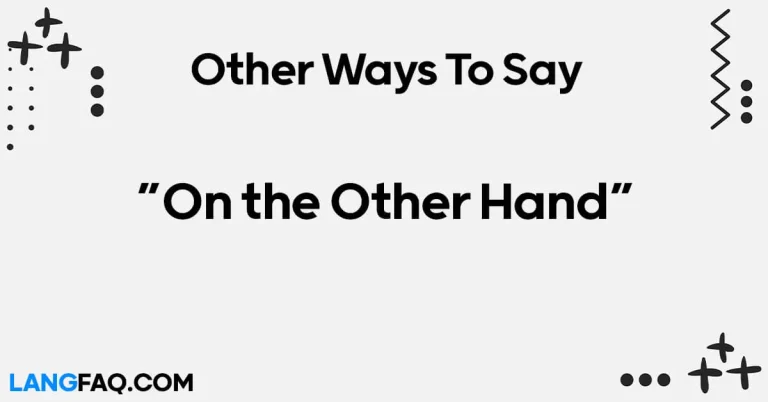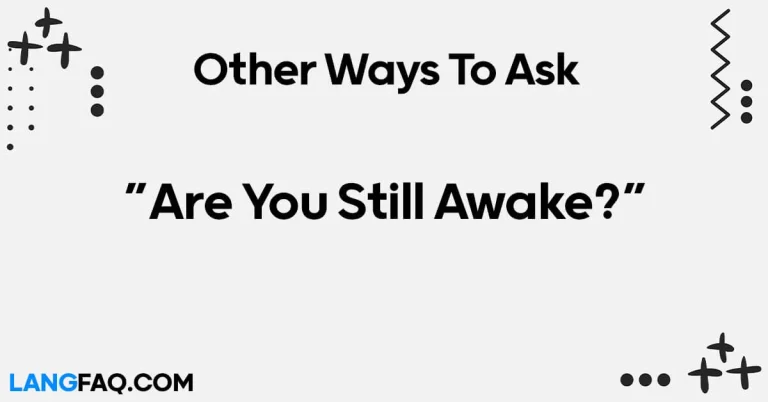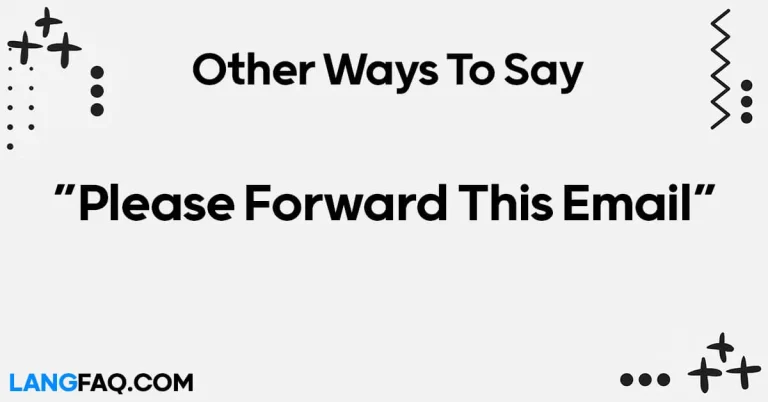In a world filled with hustle and bustle, mastering the art of relaxation becomes paramount. In this guide, we explore “12 Other Ways to Say ‘No Worries'” – a collection of phrases that can add a touch of calm to your conversations. Let’s delve into these alternatives and embrace a stress-free mindset.
12 Other Ways to Say “No Worries”
Here are 12 other ways to say “No Worries”:
- Forget About It: A casual way to tell someone not to stress over a situation.
- It’s All Good: Conveying that everything is fine and there’s no need to worry.
- No Need to Fret: Encouraging someone not to dwell on concerns or anxieties.
- All Is Well: Assuring that everything is in order and there’s no cause for worry.
- Don’t Sweat It: A relaxed way to say that the situation is not a big deal.
- You’re in Good Hands: Offering reassurance and indicating that the person is taken care of.
- It’s in Safe Hands: Ensuring someone that a situation is under control and there’s no need to worry.
- I’ve Got It Covered: Communicating that the matter is handled, and there’s no reason for concern.
- No Big Deal: Downplaying the significance of a situation to ease someone’s worries.
- Everything is Under Control: Emphasizing that the situation is well-managed and there’s no need for concern.
- I’ve Handled It: Indicating that the matter has been taken care of and there’s no need to worry.
- Take a Breather: Encouraging someone to relax and take a moment, signaling that everything is okay.
| Expression | Meaning | Example |
|---|---|---|
| Forget About It | Discard concerns, don’t dwell on the issue. | “Don’t stress about the small error, just forget about it.” |
| It’s All Good | Everything is fine, no need for worry. | “I appreciate your help; it’s all good now.” |
| No Need to Fret | Encouragement to avoid unnecessary worry. | “No need to fret over the upcoming presentation; you’ll do great.” |
| All Is Well | Assuring that everything is in good order. | “I checked the details, and all is well with the project.” |
| Don’t Sweat It | Situational reassurance, not a big concern. | “You forgot your umbrella? Don’t sweat it; I have an extra one.” |
| You’re in Good Hands | Ensuring someone is being taken care of. | “I’ll guide you through the process; you’re in good hands.” |
| It’s in Safe Hands | Implying that the situation is under control. | “Leave the planning to me; it’s in safe hands.” |
| I’ve Got It Covered | Expressing capability in handling a matter. | “You focus on your tasks; I’ve got the project covered.” |
| No Big Deal | Minimizing the significance of a situation. | “Spilling coffee on my shirt is no big deal; it happens.” |
| Everything is Under Control | Emphasizing that the situation is managed. | “The schedule may change, but everything is under control.” |
| I’ve Handled It | Confirming that a matter has been dealt with. | “You don’t need to worry; I’ve handled the issue with the client.” |
| Take a Breather | Advising to relax and take a moment. | “Feeling overwhelmed? Take a breather, and we can discuss it later.” |
These alternative expressions for “No Worries” offer a spectrum of ways to reassure, calm, and minimize concerns in various situations. Adding these phrases to your communication toolkit can contribute to a positive and stress-free atmosphere in your interactions.
Is It Correct to Say “No Worries”?
Absolutely! “No worries” is a commonly used and perfectly acceptable phrase in English. It serves as a casual and friendly way to reassure someone that everything is okay or that there’s no need for concern or apology. This expression is often used to convey a laid-back and easygoing attitude, promoting a positive and stress-free atmosphere in conversation.
When to Use “No Worries”:
- Informal Settings: It’s particularly common in casual conversations among friends, family, or colleagues.
- Reassurance: Use it when you want to assure someone that a minor mistake or inconvenience is not a big deal.
Example Sentences:
- Informal Conversation:
- Friend 1: “Sorry I’m a bit late!”
- Friend 2: “No worries! Glad you made it.”
- Reassuring a Colleague:
- Colleague: “I forgot to include the attachment in the email.”
- Response: “No worries at all! You can send it in a follow-up message.”
Variations:
- Informal: No worries
- Slightly More Formal: No problem
- Professional Setting: It’s okay, no need to apologize
Using “No worries” in conversation adds a friendly and understanding tone, making it widely embraced in various social and professional contexts.
Professional Mail Example With “No Worries”
Subject: Clarification on Project Timeline
Dear [Recipient’s Name],
I trust this email finds you well. I wanted to touch base regarding the project timeline we discussed in our recent meeting.
I noticed there might be a slight delay in one of the deliverables, but no worries at all. I understand that unexpected challenges can arise, and I appreciate your dedication to ensuring the quality of the project.
If there are any additional resources or support needed to address the delay, please don’t hesitate to reach out. We’re a team, and together we can overcome any obstacles that come our way.
Thank you for your continued efforts and commitment to the project’s success. Looking forward to your updates.
Best regards,
[Your Full Name] [Your Position] [Your Company] [Contact Information]
Forget About It: Letting Go of Minor Concerns
In the fast-paced world we navigate daily, minor slip-ups and hiccups are inevitable. Instead of dwelling on these small issues, a casual and effective way to reassure someone is by saying, “Forget about it.” This phrase is versatile, suitable for both formal and informal contexts.
When to Use:
- Formal Context: After a minor error in a work-related setting, like a missed meeting or a small mistake in a report.
- Informal Context: When a friend apologizes for a trivial matter, such as being a few minutes late to a casual gathering.
Example: Formal: “I appreciate your concern about the oversight in the report, but it’s minor. Forget about it; we can address it in the next version.”
Informal: “Hey, I forgot to bring the snacks. Oh, forget about it! We can enjoy the game without them.”
Variations:
- Colleague Relationship: “Let’s move on; it’s not worth dwelling on.”
- Friendship: “No big deal! We’re here to have fun, not stress about the little things.”
Email Sample:
Subject: Regarding Yesterday’s Meeting
Hi [Recipient’s Name],
I hope this email finds you well. I noticed there was a minor oversight in yesterday’s meeting agenda. However, I believe it’s a negligible issue that we can easily address in our next session. Forget about it for now; let’s focus on the upcoming projects.
Best regards, [Your Name]
It’s All Good: Assuring a Positive Outcome
When you want to communicate that everything is fine and there’s no need for worry, the phrase “It’s all good” is your go-to choice. This expression radiates optimism and is suitable for various scenarios, fostering a positive atmosphere.
When to Use:
- Formal Context: Assuring a colleague that a small setback won’t impact the overall project.
- Informal Context: Reassuring a friend who is concerned about a minor issue.
Example: Formal: “The client requested a small revision, but it’s all good. I’ll make the adjustments and send the updated version.”
Informal: “I know you’re worried about the weather for our picnic, but trust me, it’s all good. A little rain won’t ruin our fun!”
Variations:
- Mentor-Mentee Relationship: “No need to stress; you’re learning, and it’s all good.”
- Family Setting: “Your grades might have slipped a bit, but it’s all good. We’ll work on improving together.”
Email Sample:
Subject: Update on Project Status
Hello [Recipient’s Name],
I wanted to update you on the client’s feedback. They had a few suggestions, but nothing major. Rest assured, it’s all good, and we’ll have the final version ready soon.
Best, [Your Name]
No Need to Fret: Encouraging Ease in Worrisome Situations
Encouraging someone not to dwell on concerns or anxieties becomes crucial in both professional and personal settings. The phrase “No need to fret” conveys a sense of understanding and support, making it an effective choice in such situations.
When to Use:
- Formal Context: After a team member expresses worry about meeting tight deadlines.
- Informal Context: When a friend is anxious about an upcoming event or task.
Example: Formal: “I understand the pressure, but no need to fret about the deadline. We’ll work together to ensure everything is completed on time.”
Informal: “You’re stressing about the party details? No need to fret! We’ve got everything under control.”
Variations:
- Manager-Employee Relationship: “I see you’re concerned about the project. No need to fret; we’ll strategize and overcome any challenges.”
- Peer Support: “Exams are approaching, but no need to fret. We’ll study together and ace them.”
Email Sample:
Subject: Addressing Concerns About Project Timelines
Dear [Recipient’s Name],
I sensed some worry about our project deadlines in your recent update. No need to fret; I appreciate your dedication, and together, we’ll navigate any challenges that arise.
Best regards, [Your Name]
All Is Well: Ensuring Smooth Sailing in Any Situation
When assuring that everything is in good order and there’s no need for worry, “All Is Well” becomes a powerful phrase. Its versatility allows it to be used in various contexts, providing comfort and confidence.
When to Use:
- Formal Context: Assuring a client that their concerns have been addressed and resolved.
- Informal Context: Comforting a friend who is apprehensive about a shared responsibility.
Example: Formal: “I understand your concerns, but rest assured, we’ve implemented the necessary changes. All is well with the project.”
Informal: “You’re worried about the presentation? Don’t be! We’ve prepared thoroughly, and all is well. Let’s nail it together.”
Variations:
- Parental Comfort: “I know exams are stressful, but remember, all is well. Just do your best, and we’ll support you.”
- Team Collaboration: “Everyone contributed, and all is well with the final report. Great job, team!”
Email Sample:
Subject: Resolving Client Concerns
Hi [Recipient’s Name],
I wanted to update you on the client’s concerns you mentioned earlier. I’ve addressed them, and after our discussion, they are satisfied. All is well on that front.
Best, [Your Name]
Don’t Sweat It: A Light-hearted Approach to Small Setbacks
In situations where a minor issue arises, and you want to convey that it’s not a significant concern, “Don’t sweat it” is a perfect choice. This phrase adds a touch of humor and reassures the person that everything is under control.
When to Use:
- Formal Context: When a colleague apologizes for a minor oversight during a team meeting.
- Informal Context: Comforting a friend who is worried about a minor mishap.
Example: Formal: “No need to apologize for the mix-up; it happens to everyone. Don’t sweat it; let’s focus on the solutions.”
Informal: “You forgot the ingredients for the recipe? Don’t sweat it; we can make something else. It’s no big deal.”
Variations:
- Professional Environment: “You made a small error in the report, but don’t sweat it. We’ll fix it in the next version.”
- Friendship Dynamics: “I forgot to bring the board game, but don’t sweat it. We can find another activity to enjoy.”
Email Sample:
Subject: Regarding Yesterday’s Oversight
Dear [Recipient’s Name],
I heard your concern about the oversight during yesterday’s meeting. Honestly, don’t sweat it; we all overlook things occasionally. Let’s work together to ensure it doesn’t happen in the future.
Best regards, [Your Name]
You’re in Good Hands: Providing Reassurance and Support
When someone is unsure or anxious about a situation, assuring them that they are in good hands is a comforting phrase. Whether in a professional or personal setting, this expression communicates trust and support.
When to Use:
- Formal Context: Comforting a client worried about the outcome of a complex project.
- Informal Context: Reassuring a friend who is uncertain about trying something new.
Example: Formal: “I understand your concern about the project’s success. Rest assured, you’re in good hands. We have a dedicated team working on it.”
Informal: “Feeling nervous about the hiking trip? Don’t worry; I’ve planned everything. You’re in good hands!”
Variations:
- Managerial Support: “You’re taking on a challenging task, but trust me, you’re in good hands. I’ll guide you every step of the way.”
- Supportive Friendship: “Starting a new hobby can be intimidating, but with me by your side, you’re in good hands. Let’s enjoy the process.”
Email Sample:
Subject: Easing Concerns About Upcoming Project
Hi [Recipient’s Name],
I sensed a bit of concern about the upcoming project in your recent email. I want to assure you that you’re in good hands. Our team is well-equipped to handle the challenges, and I’m here to support you.
Best regards, [Your Name]
It’s in Safe Hands: Ensuring Control and Competence
When conveying that the situation is under control and well-managed, the phrase “It’s in safe hands” instills confidence. This expression is particularly effective in professional environments and situations that require a sense of security.
When to Use:
- Formal Context: Reassuring stakeholders about the stability of a financial investment or business decision.
- Informal Context: Comforting a friend who is anxious about a shared responsibility.
Example: Formal: “I understand the importance of this investment. Rest assured, it’s in safe hands, and we have a comprehensive strategy in place.”
Informal: “You’re worried about the road trip? Relax! I’ve planned it thoroughly, and the itinerary is in safe hands.”
Variations:
- Project Management: “The client is concerned about the project timeline, but I assure them it’s in safe hands. We have contingency plans in place.”
- Personal Responsibility: “Your pet is in safe hands with me. I’ll ensure they get the care and attention they need.”
Email Sample:
Subject: Addressing Concerns About Project Stability
Hello [Recipient’s Name],
I noticed some concerns about the stability of our ongoing project. I want to reassure you that it’s in safe hands. Our team is diligently working to ensure its success.
Best, [Your Name]
I’ve Got It Covered: Conveying Capability and Assurance
When you want to communicate that you have taken charge and a matter is well in hand, the phrase “I’ve got it covered” is your assurance ticket. This expression instills confidence, making it a valuable addition to both professional and personal interactions.
When to Use:
- Formal Context: Assuring a client that their concerns have been noted and are being addressed effectively.
- Informal Context: Reassuring a friend or family member that you’re taking care of a situation.
Example: Formal: “Thank you for highlighting those issues. I want to assure you that I’ve got it covered. We’re implementing corrective measures to enhance the project’s success.”
Informal: “You’re worried about the surprise party details? Relax! I’ve got it covered. It’s going to be a fantastic celebration.”
Variations:
- Leadership Communication: “The team is concerned about the upcoming challenges, but as the leader, I want to assure everyone that I’ve got it covered. We’ll overcome this together.”
- Personal Commitment: “You’re anxious about the weekend plans? No worries! I’ve got it covered. It’ll be a relaxing and enjoyable time.”
Email Sample:
Subject: Addressing Recent Concerns
Hi [Recipient’s Name],
I appreciate you bringing up those concerns in our last meeting. I want to assure you that I’ve got it covered. We’ve devised a plan to address each point and ensure a smooth process.
Best, [Your Name]
No Big Deal: Minimizing the Significance of Situations
When you want to downplay the importance of a situation and convey that it’s not a significant concern, “No big deal” is the phrase to use. This expression adds a light-hearted touch, making it suitable for various casual scenarios.
When to Use:
- Formal Context: Responding to a colleague who apologizes for a minor disruption during a presentation.
- Informal Context: Comforting a friend who is worried about a small mistake.
Example: Formal: “You’re concerned about the small glitch in the presentation? No big deal! It happens to the best of us, and the overall message was well-received.”
Informal: “Forgot to bring the dessert? No big deal! We can enjoy the meal without it. The company matters more.”
Variations:
- Team Collaboration: “We missed a small detail in the project, but no big deal. Let’s correct it in the next iteration and move forward.”
- Friendship Dynamics: “You spilled coffee on my favorite book? No big deal! It’s just a thing; our friendship is more important.”
Email Sample:
Subject: Regarding Yesterday’s Presentation
Hello [Recipient’s Name],
I noticed your concern about the hiccup in yesterday’s presentation. No big deal! We all encounter these moments. Let’s focus on the positive feedback we received.
Best regards, [Your Name]
Everything is Under Control: Emphasizing Stability and Management
When assuring that the situation is well-managed and stable, the phrase “Everything is under control” becomes a powerful declaration. This expression is effective in professional contexts where stability and control are essential.
When to Use:
- Formal Context: Reassuring stakeholders about a project’s progress and the mitigation of potential risks.
- Informal Context: Comforting a friend or family member who is anxious about a situation.
Example: Formal: “I understand the concerns about the project timeline. Rest assured, everything is under control. We have contingencies in place to handle any unexpected challenges.”
Informal: “Feeling overwhelmed about the move? Relax! Everything is under control. I’ve planned each step, and it will go smoothly.”
Variations:
- Business Leadership: “The team is expressing concerns about the changes, but as the leader, I want to assure everyone that everything is under control. We have a strategic plan in place.”
- Personal Responsibility: “You’re anxious about the event details? No worries! Everything is under control. I’ve coordinated everything, and it will be a success.”
Email Sample:
Subject: Project Update and Assurance
Hi [Recipient’s Name],
I’ve sensed some concerns about the project’s progress in recent discussions. I want to assure you that everything is under control. We’ve implemented measures to ensure success.
Best, [Your Name]
I’ve Handled It: Confirming Resolution and Competence
When you want to convey that a matter has been dealt with and resolved competently, the phrase “I’ve handled it” communicates capability and assurance. This expression is particularly effective in professional settings.
When to Use:
- Formal Context: Informing a client that their specific concerns have been addressed and resolved.
- Informal Context: Comforting a friend or family member that you’ve taken care of a situation.
Example: Formal: “Thank you for bringing up those issues. I want to assure you that I’ve handled it. The necessary steps have been taken to address and resolve the concerns.”
Informal: “You were worried about the leaky faucet? No worries! I’ve handled it. I called a plumber, and it’s all fixed now.”
Variations:
- Managerial Communication: “The team expressed concerns about the project challenges, but rest assured, I’ve handled it. We’ve implemented solutions to overcome obstacles.”
- Personal Responsibility: “You were concerned about the dinner plans? Relax! I’ve handled it. The reservations are made, and everything is set for a great evening.”
Email Sample:
Subject: Resolution of Recent Issues
Hello [Recipient’s Name],
I acknowledge your concerns about the recent issues raised. I want to update you that I’ve handled it. The necessary actions have been taken to ensure a smooth process moving forward.
Best regards, [Your Name]
Take a Breather: Encouraging Relaxation in Stressful Moments
When the tension is high and someone needs a moment to relax, the phrase “Take a Breather” offers a gentle suggestion to step back and de-stress. This expression is suitable for both professional and personal situations.
When to Use:
- Formal Context: Advising a colleague to take a short break during a high-pressure work scenario.
- Informal Context: Comforting a friend who is overwhelmed by personal challenges.
Example: Formal: “I can see the pressure building up. Why don’t you take a breather? A short break can do wonders for your focus and productivity.”
Informal: “You’re stressed about the upcoming exams? Take a breather! Step outside, take a deep breath, and then come back to study with a refreshed mind.”
Variations:
- Workplace Well-being: “The team is feeling the stress of the approaching deadline. I suggest everyone take a breather, recharge, and return with renewed energy.”
- Friendship Support: “Life can be overwhelming at times. When it gets too much, take a breather. I’m here to support you through it.”
Email Sample:
Subject: Reminder for Self-Care
Hi [Recipient’s Name],
I noticed the intense workload you’ve been handling lately. Just a friendly reminder to take a breather when needed. A short break can make a significant difference in how we approach challenges.
Take care, [Your Name]
FAQs
How can I convey reassurance without saying ‘No Worries’? You can convey reassurance by using phrases like “Rest assured,” “I’ve got it covered,” or “You’re in good hands.” These alternatives communicate confidence and support.
Are these phrases suitable for both formal and informal settings? Absolutely! The suggested phrases work well in various settings, from casual conversations with friends to formal business interactions.
Can I use these alternatives in professional emails? Certainly. Incorporating phrases like “Everything is under control” or “I’ve handled it” adds a touch of professionalism while conveying a sense of assurance.
Do these alternatives work universally, regardless of cultural differences? Yes, these alternatives are versatile and can be used across cultures to convey a positive and calming message.
How do I encourage a relaxed atmosphere without explicitly saying ‘No Worries’? Promote a relaxed atmosphere by using phrases like “Take it easy,” “Chill out,” or “Stay calm.” These alternatives subtly encourage a carefree and easygoing vibe.
Can these alternatives replace ‘No Worries’ in all situations? Certainly! Feel free to experiment with these alternatives in various situations to find the perfect fit for your conversations.
Conclusion
Mastering the art of saying “No Worries” involves exploring diverse alternatives that not only convey reassurance but also radiate positivity. By incorporating these phrases into your daily conversations, you can create a calm and stress-free environment. So, why worry when you have a repertoire of verbal escapes at your disposal?

